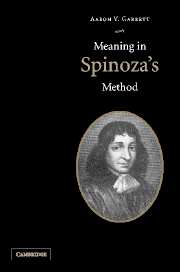Book contents
- Frontmatter
- Contents
- Acknowledgments
- List of abbreviations
- Texts and editions
- Introduction
- 1 A worm in the blood: some central themes in Spinoza's Ethics
- 2 A few further basic concepts
- 3 Emendative therapy and the Tractatus de Intellectus Emendatione
- 4 Method: analysis and synthesis
- 5 Maimonides and Gersonides
- 6 Definitions in Spinoza's Ethics: where they come from and what they are for
- 7 The third kind of knowledge and “our” eternity
- Bibliography
- Index of passages referred to and cited
- General index
6 - Definitions in Spinoza's Ethics: where they come from and what they are for
Published online by Cambridge University Press: 22 September 2009
- Frontmatter
- Contents
- Acknowledgments
- List of abbreviations
- Texts and editions
- Introduction
- 1 A worm in the blood: some central themes in Spinoza's Ethics
- 2 A few further basic concepts
- 3 Emendative therapy and the Tractatus de Intellectus Emendatione
- 4 Method: analysis and synthesis
- 5 Maimonides and Gersonides
- 6 Definitions in Spinoza's Ethics: where they come from and what they are for
- 7 The third kind of knowledge and “our” eternity
- Bibliography
- Index of passages referred to and cited
- General index
Summary
Here readers will doubtless come to a standstill and they will imagine many things that will give them pause. This is why I ask that they continue with me, stepping slowly, and that they move forward and not judge until they have read everything through.
EthicsiipiisSpinoza's discussion of method in the TIE concludes with his incomplete attempt to provide a means by which to discover adequate definitions. Why are definitions so important for Spinoza? In order for a philosophy to be rational and adequate it must be grounded in a “true and legitimate definition” (TIE 99). This would hold for many philosophers other than Spinoza, notably Hobbes. It also seems to be a given of deductive or Euclidean modes of philosophizing. Weigel, Leibniz's teacher and enthusiast for the mos geometricus, emphasized that the Euclidean method, unlike the account of science that Aristotle gives in Physics, moves from known to unknown. Rather the Euclidean method was consistent with Aristotle's Analytics, and Weigel argued that it could lead to a reconciliation of the old and new wisdom. For Spinoza, the mos geometricus is a process that gets at things and ideas, and in so doing provides us access to the logical and metaphysical structure of the world we inhabit. And any geometric demonstration must begin with definitions. So definitions are the crucial wedge that moves us beyond our part of nature, our limitations, and opens up the understanding to those things excellent, difficult, and rare.
- Type
- Chapter
- Information
- Meaning in Spinoza's Method , pp. 144 - 180Publisher: Cambridge University PressPrint publication year: 2003



